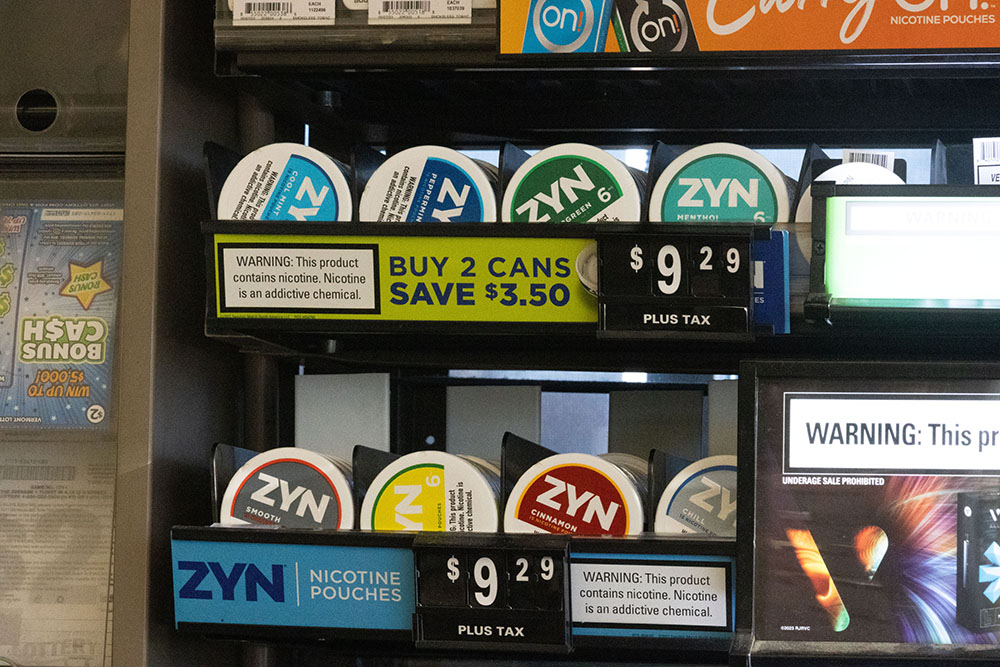

Cole Dube | Staff Writer | cdube@mail.smcvt.edu
The pathways to class, water fountains, and even the urinals on campus have seen an increase in discarded small nicotine pouches called Zyn’s. While St. Michael’s College is a tobacco-free campus, Zyn’s have greatly grown in popularity in the past few years. According to the National Library of Medicine, Zyn sales increased from 126 million in 2019 to 808 million sold in the first 3 months of 2022 alone.
Zyn’s are touted as a tobacco-free alternative to smoking, with up to 10 different flavors to choose from. Though “marketed to users” 21+, they have become increasingly popular amongst underage students across college campuses nationwide. St Michael’s is no exception. A large part of the rising popularity of this product stems from its marketing online through Tik Tok and other social media platforms. Zyn pouches contain nicotine salt, which makes the product highly addictive; adding stabilizers, fillers, pH adjusters, and sweeteners to further hook users. According to the Center for Disease and Control and Prevention (CDC), the long term side effects of using nicotine can increase the risk of cardiovascular and respiratory disorders. It can also hinder brain development in adolescence and young adults.
Mike Rollo, a 13 year associate for the American Cancer Society, said there may not be a direct link between nicotine users and cancer. However, the other carcinogens, and the nicotine products can lead to the cause of cancer. “It’s the nicotine that hooks people, and then exposes them to the carcinogens that cause cancer,”Rollo said. “The long-term effects of this product can lead to mouth and lip cancer because of the chemicals within these little pouches.”



It is almost inevitable to come across this product on campus. Andrew Richards, ’25 was first introduced to Zyn’s through his older brother, who started to use them as an alternative to vaping. “When I noticed the health effects that vaping was having on my lungs, I decided to make the switch to Zyn’s”, Richards said. “There are many different options for flavors. I only just tried all of them, and I have been using them for over a year now. I think they are so popular here because drinking and using nicotine go hand in hand,” Richards said.
When discussing the long term effects of Zyns, Richard is not too concerned,
“Yes, I sort of know the health effects, but personally, I haven’t had to deal with them that badly yet,”Richard said. “Besides some skin on my gums coming off, I haven’t been scared enough yet to stop. I think it’s going to take something more drastic for me to stop using.”
-Andrew Richard
Lily Maxted, ’25, has seen a great amount of this new product in her everyday life. “Zyn’s are everywhere, I see them on the ground every single time I leave my dorm,” Maxted said. “One time I saw a kid put two Zyn’s in their mouth before our 8 a.m. class. They were definitely on campus last year, but this year everyone seems to be doing them.”
Tina Zuck, government relations director at the American Heart Association, emphasizes the long-term risks. “A brand new study released at our National Stroke conference shows nicotine impacting cognitive performance, and increases the risk of dementia,” Zuck said.
“In fact, users are 40% more likely to develop Alzheimer’s. Since there is significant nicotine in vape devices, it stands to reason there is similar risk from using patches like Zyn’s. Nicotine also increases the risk of stroke, and that number is doubled in Black Americans,” Zuck said.
Although long-term effects have not been significantly researched, health consequences of this product are pointing to harmful results. Experts urge college age users to consider the research, and educate yourself before allowing toxic chemicals into your body.

